Volga Germans
The Volga Germans (German: Wolgadeutsche, pronounced [ˈvɔlɡaˌdɔɪ̯t͡ʃə] (![]() listen)), Russian: поволжские немцы, romanized: povolzhskiye nemtsy) are ethnic Germans who settled and historically lived along the Volga River in the region of southeastern European Russia around Saratov and to the south. Recruited as immigrants to Russia in the 18th century, they were allowed to maintain their German culture, language, traditions and churches (Lutheran, Reformed, Catholics, Moravians and Mennonites). In the 19th and early 20th centuries, many Volga Germans emigrated to United States, Canada, Brazil and Argentina.
listen)), Russian: поволжские немцы, romanized: povolzhskiye nemtsy) are ethnic Germans who settled and historically lived along the Volga River in the region of southeastern European Russia around Saratov and to the south. Recruited as immigrants to Russia in the 18th century, they were allowed to maintain their German culture, language, traditions and churches (Lutheran, Reformed, Catholics, Moravians and Mennonites). In the 19th and early 20th centuries, many Volga Germans emigrated to United States, Canada, Brazil and Argentina.
Wolgadeutsche | |
|---|---|
.svg.png.webp) Flag of Volga Germans | |
| Total population | |
| 594,138 | |
| Regions with significant populations | |
| 394,138[1] |
| 200,000[2] | |
| Languages | |
| German, Russian, Kazakh | |
| Religion | |
| Lutheran, Roman Catholicism, Mennonite | |
During the Great Purge of 1936 to 1938, the Soviet government began targeting ethnic groups who were part of the intellectual class such as the Volga Germans, who were then subjected to forced deportation and extreme repression, some tens of thousands were also killed during the massacres in Belarus. They were deported eastward, which caused many thousands of deaths. Finally, in 1941, by order of Stalin, all ethnic Germans of Russia were deported to forced labor gulag concentration camps located in Siberia and other areas of Central Asia, leading to genocide.[3][4][5][6][7][8] Later, with the opening of the borders after the collapse of the Soviet Union, several survivors chose to emigrate to Germany.
Currently, the only figures on the population of German descent are those published by the Russian government.
Invitation to Russia

In 1762, Catherine II, born a German princess and a native of Stettin, Pomerania, deposed her husband Peter III, born a German prince in Kiel, and took the Russian imperial throne. Following the lead of Maria Theresa, Empress of Austria and Hungary, inviting Germans to settle on the Danube in the Balkans, Catherine the Great published manifestos in 1762 and 1763 inviting Europeans (except Jews)[9] to immigrate and become Russian subjects and farm Russian lands while maintaining their language and culture. Although the first received little response, the second improved the benefits offered and was more successful in attracting colonists. People in other countries such as France and England were more inclined to migrate to the colonies in the Americas. Other countries, such as Austria, forbade emigration.
Those who went to Russia had special rights under the terms of the manifesto. Some, such as being exempt from military service, were revoked in the latter part of the 19th century when the government needed more conscripts for the Russian army. The Plautdietsch-speaking Mennonite communities were opposed to military service because of their pacifist beliefs, so many Mennonites emigrated to the Americas instead.
19th century
At the end of the 19th century, the Russian empire began to apply an aggressive policy of Russification. Although they had been promised a degree of relative autonomy (including being exempt from conscription) when they settled in the Russian empire, the Russian monarchy gradually eroded their specific rights as time went on. The Germans began to suffer a considerable loss of autonomy. Conscription was eventually reinstated. That was not wanted and was especially harmful to the Mennonites, who practice pacifism. Throughout the 19th century, pressure increased from the Russian government to culturally assimilate. Many Germans from Russia found it necessary to emigrate to avoid conscription and preserve their culture. This caused some Germans to organize themselves and send emissaries to some countries in the Americas in order to assess potential settlement destinations. The chosen destinations were Canada, United States, Brazil and Argentina. Most Volga Germans who settled in Latin America were Catholic. Many Catholic Volga Germans chose South America as their new homeland because the nations shared their religion.
North America

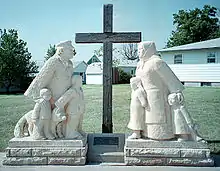
Germans from Russia were the most traditional of German-speaking arrivals to North America. In the United States, many settled primarily in the Dakotas, Kansas, and Nebraska by 1900. The south-central part of North Dakota was known as "the German-Russian triangle" (that includes descendants of Black Sea Germans). A smaller number moved farther west, finding employment as ranchers and cowboys. They also settled in Iowa, Michigan, Minnesota, Oregon (especially in Portland[10]), Washington, Wisconsin, and Fresno County in California's Central Valley. They often succeeded in dryland farming, which they had practiced in Russia. Many of the immigrants who arrived between 1870 and 1912 spent a period doing farm labor, especially in northeastern Colorado and in Montana along the lower Yellowstone River in sugar beet fields. Colonies kept in touch with each other through newspapers, especially Der Staats Anzeiger, based in North Dakota. By author Richard Sallet's count, there were 118,493 descendants of Volga Germans of the first and second generation living in the United States according to the 1920 United States census.[11]
In Canada, the largest groups settled mainly in the area of the Great Plains: Alberta, Manitoba, and Saskatchewan.
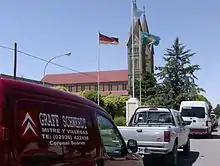
South America
Germans from Russia also settled in Argentina (see German Argentines) and Brazil (see German Brazilians). Additionally, many of the Volga Germans who had previously settled in Brazil later also went to settle in Argentina, due to the difficulties of planting wheat in Brazil, among other reasons.
In Argentina, Volga Germans have founded many colonies or villages. For example, around the city of Coronel Suárez in the South of Buenos Aires Province, around the city of Crespo in Entre Ríos Province, along the East of La Pampa Province, etc. Every year, the community of Volga German descendants holds different celebrations in the country in which they keep their traditions alive. For example, the Kerb (festival to honour the patron saint of a colony),[12] the Kreppelfest,[13] the Strudelfest,[14] the Füllselfest,[15] the Schlachtfest[16] (also promoted by its Spanish name Fiesta de la Carneada), the Fiesta del Pirok (Bierock festival),[17] etc.
Today 8% of the Argentine population or 3.5 million Argentines claim German ancestry. Of those, more than 2.5 million claim Volga German descent,[18] making them the majority of those having German ancestry in the country, and accounting for 5.7% of the total Argentinian population. Descendants of Volga Germans outnumber descendants of Germans from Germany, which number 1 million in Argentina (2.3% of the population).
20th century
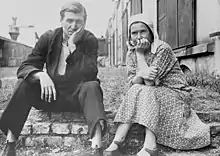
Following the Russian Revolution, the Volga German Autonomous Soviet Socialist Republic (German: Autonome Sozialistische Sowjet-Republik der Wolga-Deutschen; Russian: АССР Немцев Поволжья) was established in 1924, and it lasted until 1941. Its capital was Engels, known as Pokrovsk (Kosakenstadt in German) before 1931.
Deportation and genocide of the Germans from USSR
The deportation of the Volga Germans was the Soviet forced transfer of the whole of the Volga German population from the Volga German Autonomous Soviet Socialist Republic to Gulag concentration camps of forced labor located in Siberia, Kazakhstan and even in arctic locations. These deportations, which also included the rest of the ethnic Germans from Russia, had been applied for several years before World War II and became particularly exhaustive on September 3, 1941, during the war.
Of all the ethnic German communities in the Soviet Union, the Volga Germans represented the single largest group expelled from their historical homeland. All their possessions were confiscated and they were deported only because of their ethnicity. Shortly after the German invasion, on June 22, 1941, Stalin sent Beria and Molotov to the Volga German Autonomous Soviet Socialist Republic to determine a course of action for its German inhabitants, as a way of carrying out collective revenge on the civilian population. On return, they recommended the deportation of the entire German population. Consequently, the Central Committee of the Communist Party issued a resolution on August 12, calling for the expulsion of the entire ethnic German population. With this authority, Beria on August 27 issued an order entitled "On Measures for Conducting the Operation of Resettling the Germans from the Volga German Republic, Saratov, and Stalingrad Oblasts", assigning the deputy head of the NKVD, (secret police) Ivan Serov, to command this operation. He also allocated NKVD and Red Army troops to carry out the transfer. The Germans were to be sent to various oblasts (provinces) in Siberia, Kazakhstan and others, beginning on September 3, and ending on September 20, 1941. On September 7, 1941, the Volga German Autonomous Soviet Socialist Republic was officially abolished, clearly showing that the Soviets considered the expulsion of the Germans final.
On August 28, 1941, the Presidium of the Supreme Soviet of the USSR approved and published a decree, which was the only official decree ever published by the Soviet Union concerning the deportation and exile of the German Russian community. The Soviet regime stated that the evacuation was a preventive measure so that the German population would not be misled into collaborating with the German Army rather than a punitive measure, and they did not reveal the sentence to the forced labor camps. Stalin allegedly gave the following "secret" order to the NKVD, produced in German controlled Latvia on September 20, 1941:
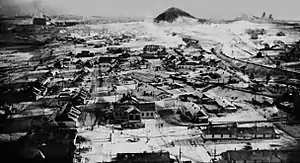
"After the house search, tell everyone who is scheduled to be deported that, according to the government's decision, they are being sent to other regions of the USSR. Transport the entire family in one car until the train station, but at the station, heads of families must be loaded into a separate train car prepared especially for them. Their families are deported for special settlements in the far away regions of the Union. [Family members] must not know about the forthcoming separation from the head of the family."[19]
This above document may be a fabrication, as Latvia was under German occupation at that time. Nevertheless, the instructions were followed by the NKVD troops who directed the deportation.[20]
The reason for separating the men is that they were all destined for forced labor camps, Trudarmee (NKVD labor army). The deported and enslaved Germans coined this phrase, whereas Soviet documents only referred to "labor obligations" or "labor regulations." Men between the ages of 15 and 55 and, later, women between the ages of 16 and 45 were forced to do labor in the forests and mines of Siberia and Central Asia under conditions similar to that prevalent in the Gulag forced labor camps, while other Germans were directly deported to Gulag forced labor camps.[20]
The expulsion of the Volga Germans finished on schedule at the end of September 1941. According to the Soviet Union, the total number sent to forced internal exile was about 950,000. However, the actual estimated number of victims is much higher. It took 151 train convoys to accomplish the first transfers of the Volga German population, an astounding figure when one considers that the Soviet Union was heavily engaged fighting the advancing German army, and all railway stock was required to bring soldiers to the front. This operation also involved 1,550 NKVD and 3,250 police agents assisted by 12,150 soldiers of the Red Army.[21]
In 1941, after the Nazi invasion, the NKVD (via Prikaz No. 35105) banned ethnic Germans from serving in the Soviet military. They sent tens of thousands of these soldiers to the Trudarmee.[22]
In 1942, nearly all the able-bodied German population was conscripted to the NKVD labor columns or had been sent to the Gulag forced labor camps. According to Stanford historian Robert Conquest, during the first stage, about one-third did not survive the camps.[23] The conditions imposed on ethnic Germans by the regime continued to be inhumane, ultimately leading to the genocide of Germans from Russia.[24][25][26][27][28][29]
Recent years
The Volga Germans never returned to the Volga region in their old numbers. They were not allowed to settle in the area for decades. After World War II, many survivors remained in the Ural Mountains, Siberia, Kazakhstan (1.4% of today's Kazakh population are recognized as Germans - around 200,000), Kyrgyzstan, and Uzbekistan (about 16,000 or 0.064%).[2] Decades after the war, some talked about resettling where the German Autonomous Republic used to be. But all their properties had been occupied by Russian communists. They met opposition from the new population there and did not persevere.
A proposal in June 1979 called for a new German Autonomous Republic within Kazakhstan, with a capital in Ermentau. The proposal was aimed at addressing the living conditions of the displaced Volga Germans. At the time, around 936,000 ethnic Germans were living in Kazakhstan, as the republic's third-largest ethnic group. On June 16, 1979, demonstrators in Tselinograd (Astana) protested this proposal. Fearing a negative reaction among the majority Kazakhs and calls for autonomy among local Uyghurs, the ruling Communist Party scrapped the proposal for ethnic German autonomy within Kazakhstan.
Since the late 1980s and the fall of the Soviet Union, some ethnic Germans have returned in small numbers to Engels, but many more emigrated permanently to Germany. They took advantage of the German law of return, a policy that grants citizenship to all those who can prove to be a refugee or expellee of German ethnic origin or as the spouse or descendant of such a person.
Since the collapse of the Soviet Union in 1991 and the independence of the Baltic states, some Russian ethnic Germans began to return to the area of the Kaliningrad Oblast (formerly part of East Prussia), especially Volga Germans from other parts of Russia and Kazakhstan, as well as to the Volga Germans' old territory in southern Russia near Volgograd. This tempo increased after Germany stopped granting the free right of return to ethnic Germans from the former Soviet Union. As of the 2002 Russian census, 8,340 Germans (or 0.87% of the population) were listed in the Kaliningrad Oblast, dropping to 7,349 in 2010 due to deaths. Volgograd Oblast counted 10,102 Germans in the 2010 Census. However, almost none of the pre-World War II German population remains in the Kaliningrad Oblast, with the vast majority of the current population recent Russian-speaking migrants. Due to the new restrictions by the German government, the flow of ethnic Germans to Germany has greatly slowed if not ceased, while the remaining Germans in Central Asia continue to emigrate, but to Russia instead of Germany.
Notable people of Volga German descent

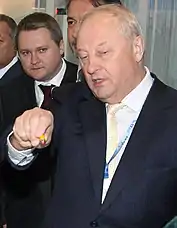
- Philip Anschutz (born 1939), American billionaire businessman.[30]
- Harold W. Bauer (1908–1942), American USMC fighter pilot.[31]
- Tom Daschle (born 1947), American politician.[32]
- Sergio Denis (1949–2020), Argentine singer-songwriter
- Jean Bethke Elshtain (1941–2013), American political philosopher and academic.[33]
- Joe Exotic (born 1963), American former Zoo owner.[34]
- Helene Fischer (born 1984), German singer, dancer and entertainer.[35]
- Tim Gaines (born 1962), American musician.[36]
- Sir Andre Geim (born 1958), Russian-born Dutch-British physicist and 2010 Nobel laureate.[37]
- Jim Geringer (born 1944), American politician, 30th Governor of Wyoming.[38]
- Sonja Graf (1908–1965), German chess player who became woman's champion of the US.
- Gabriel Heinze (born 1978), Argentine football player.[39]
- Óscar Ibáñez (born 1967), Argentine-born Peruvian football player.[40]
- Viktor Kress (born 1948), Russian politician, governor of Tomsk Oblast, Russia.[41]
- Randy Meisner (born 1946), American musician, original bassist with the Eagles.[42]
- Roman Neustädter (born 1988), Russian-German football player.[43]
- Peter Neustädter (born 1966), Kazakhstani-born German football player and coach.[43]
- Boris Rauschenbach, (1915–2001), scientist, physicist in Russia.[44]
- Eduard Rossel (born 1937), Russian politician.[45]
- Cher Scarlett (born 1984 or 1985), American software engineer and labor activist.[46]
- Alfred Schnittke (1934–1998), Russian composer.[47]
- Kendall Schmidt (born 1990), American singer of Big Time Rush.
- Robert Shwartzman (born 1999), Russian racing driver.
- Alvina Shpady (1935–2019), Uzbek artist and art restorer.[48]
- Afu Thomas (born 1988), German Internet celebrity active in China.[49]
- Mitch Unrein (born 1987), American football player.[50]
- Sergio Unrein (born 1991), Argentine football player.[51]
- Lawrence Welk (1903–1992), American entertainer.[52][53]
Language
The greatest number of Volga Germans emigrated from Hesse and the Palatinate, and spoke Hessian and Palatine Rhine Franconian dialects[54][55] to which the colonists from other regions, and even from other countries like Sweden, assimilated.[56] Some Volga German dialects are very similar to Pennsylvania German language, another Palatine Rhine Franconian language; in either dialect, one could say:[54]
- (spelled according to standard German pronunciation rules:) Mehr volla mohl gaern in die sche gehl Kaerrich geha.
- (in German:) Wir wollen einmal gern in die schöne gelbe Kirche gehen.
- (in English:) We would like to go into the beautiful yellow church.
Some other common words:[54][57]
| Volga German | Standard German | English |
|---|---|---|
| Baam (some dialects), Boum (other dialects) | Baum | tree |
| daitsch (deitsch) | deutsch | German |
| Flaasch (some dialects), Fleesch (other dialects) | Fleisch | flesh, meat |
| g'sotza | gesessen | (that has been) sat down |
| ich sin, ich bin | ich bin | I am |
| Kopp | Kopf | head |
| net | nicht | not |
| seim | seinem | his (dative) |
| un | und | and |
The above list only attempts to reproduce the pronunciation and does not represent how the Volga Germans wrote. The dialects of the Germans of Russia mainly presented differences in pronunciation, as occurs in the diversity of the English language. However, Volga Germans wrote and kept their records in Standard German.
Volga Germans only borrowed a few but anecdotal Russian words, like Erbus ("watermelon" from Russian арбуз "watermelon"),[58] which they carried with them on their subsequent moves to North America[55] and Argentina.[59]
See also
- Kazakhstan Germans
- History of Germans in Russia and the Soviet Union
- Volga German Autonomous Soviet Socialist Republic
- Volhynia
- Russian Mennonites
- Baltic Germans
References
- "Russian Census 2010: Population by ethnicity" (XLS). Perepis-2010.ru (in Russian). Retrieved 12 November 2017.
- "Stat.kz". Stat.kz. Archived from the original on 12 February 2010. Retrieved 11 November 2017.
- Kaiser, D. Philipp (2014). Moscow's Final Solution: The Genocide of the German-Russian Volga Colonies. ISBN 9780615157801.
- Sinner, Samuel D. (2000). The Open Wound: The deportation of West German Ethnic Minorities in Russia & the Soviet Union, 1915-1949 - And Beyond. ISBN 1891193082.
- Volgagermans.org
- Maier Schwerdt, Héctor (2009). Deportación a Siberia and some to fight for the Soviet Union in the Volga battalion in WW2 and Afganistan : el genocidio de los alemanes del Volga; memoria de la supresión de la República Germana del Volga en Rusia y de la deportación a Siberia de todos sus habitantes, el 28 de agosto de 1941. ISBN 978-9870565536.
- Wolgadeutsche.net Kron, Robert. Ungesühntes Verbrechen. Wolgadeutsche.net
- Federación de Asociaciones Argentino-Germanas
- Lewis, Bernard (1999). Semites and Anti-Semites. New York: W. W. Norton & Company. p. 61. ISBN 0-393-31839-7.
- "Volga Germans in Portland". Volgagermans.net. Retrieved 11 November 2017.
- "To the United States". Volgagermans.org. Retrieved 6 June 2022.
- Coronelsuarez.gob.ar
- Olavarria.gov.ar
- Diarionuevodia.com.ar
- coronelsuarez.gob.ar
- Fiestasnacionales.org
- Fiestasycaminos.com.ar
- "Alemanes del Volga. Dejaron Rusia y en Entre Ríos fundaron varias aldeas donde celebran sus tradiciones". Lanacion.com.ar. Retrieved 6 June 2022.
- Merten 2015, p. 167.
- Merten 2015, p. 168.
- Merten 2015, p. 170.
- Pohl, J. Otto. Ethnic cleansing in the USSR, 1937-1949. Greenwood Publishing Group.
- Conquest, Robert (1970). The Nation Killers. Macmillan. pp. 59–61.
- Kaiser, D. Philipp (2014). Moscow's Final Solution: The Genocide of the German-Russian Volga Colonies. ISBN 9780615157801.
- Sinner, Samuel D. (2000). The Open Wound: The Genocide of German Ethnic Minorities in Russia & the Soviet Union, 1915-1949 - And Beyond. ISBN 1891193082.
- Volgagermans.org
- Maier Schwerdt, Héctor (2009). Deportación a Siberia: el genocidio de los alemanes del Volga; memoria de la supresión de la República Germana del Volga en Rusia y de la deportación a Siberia de todos sus habitantes, el 28 de agosto de 1941. ISBN 978-9870565536.
- Wolgadeutsche.net Kron, Robert. Ungesühntes Verbrechen. Wolgadeutsche.net
- Federación de Asociaciones Argentino-Germanas
- "Anschutz, Philip F. | Volga German Institute". Archived from the original on 11 February 2017. Retrieved 7 February 2017.
- "Harold William "Indian Joe" Bauer, WW2 Marine Corps ace". acepilots.com. Retrieved 11 November 2017.
- Reitwiesner, William. "The Ancestors of Tom Daschle". Wargs.com. Retrieved 7 February 2017.
- Vitello, Paul (15 August 2013). "Jean Bethke Elshtain, a Guiding Light for Policy Makers After 9/11, Dies at 72". The New York Times. Retrieved 11 November 2017.
- Mendelsohn, Jennifer (2 April 2020). "Joe Exotic's Family History Could Be Its Own Netflix Series". Medium. Retrieved 6 October 2020.
- "Последние новости дня" [Latest news of the day]. Topnews24.ru (in Russian). Archived from the original on 22 June 2016. Retrieved 11 November 2017.
- "Family History - Tim Gaines". Tim Gaines - Official. Facebook. Archived from the original on 26 February 2022. Retrieved 11 November 2017.
- "Andre Geim – Biographical". nobelprize.org.
- "TRANSCRIPT for PODCASTS GOVERNOR JIM GERINGER : Interviewed by Mark Junge" (PDF). Wyospcr.state.wy.us. June 2009. Retrieved 12 November 2017.
- "Gabriel Heinze: El hijo de Titina y la garra de un pueblo" [Gabriel Heinze: The son of Titina and the spunk of a people] (in Spanish). Estación Plus. 14 June 2010. Archived from the original on 7 April 2014. Retrieved 7 February 2017.
- "Ibáñez Holzmann, Óscar Manuel | Volga German Institute". Archived from the original on 11 February 2017. Retrieved 7 February 2017.
- "Institute for Research of Expelled Germans -- 10,000,000+ civilians deported AFTER WWII". expelledgermans.org. Retrieved 20 January 2022.
- "Meisner, Randy | Volga German Institute". Archived from the original on 11 February 2017. Retrieved 8 February 2017.
- ""Als Mainzer geht man nicht nach Frankfurt"" [People from Mainz don't go to Frankfurt] (in German). spox.com. 25 June 2009. Retrieved 28 July 2012.
- Russian: Раушенбах, Б.В., "Пристрастие", М, Аграф, 1997, ISBN 5-7784-0020-9 . Available online www.pravbeseda.ru
- "Eduard Rossel Ergartovich, photo, biography". persona.rin.ru. Retrieved 20 January 2022.
- "House Labor & Workplace Standards Committee - TVW". tvw.org. Retrieved 20 January 2022.
- "Schnittke, Alfred | Volga German Institute". Archived from the original on 11 February 2017. Retrieved 8 February 2017.
- "Памяти Альвины Шпады" [In memory of Alvina Shpady]. Fergana Agency (in Russian). 24 June 2019. Retrieved 13 December 2021.
- "这里是中国,对面竟然是俄罗斯?! 【德国家庭的中国俄羅斯边境之旅】". YouTube (in Chinese). 12 November 2017. Retrieved 27 August 2022.
- "Unrein, Mitch | Volga German Institute". www.volga.domains.unf.edu. Retrieved 20 January 2022.
- "Unrein, Sergio | Volga German Institute". www.volga.domains.unf.edu. Retrieved 20 January 2022.
- Shearer, Lloyd (15 November 1970). "Lawrence Welk: The King of Musical Corn". Parade. pp. 10–13.
- Condon, Maurice (29 April 1967). "In Strasburg, N.D., They Remember Lawrence Welk, When He Was Leader of the Hotsy Totsy Boys". TV Guide. Retrieved 23 February 2015.
- Fred C. Koch, The Volga Germans: In Russia and the Americas, from 1763 to the Present (1977, ISBN 0271012366)
- Germany and the Americas: O-Z (2005, ISBN 1851096280)
- Koch, page 238: "even nationals like Scandinavians, Frenchmen, Italians, and Englishmen among the colonists became submerged and lost ethnically in the highly dominant Rhineland culture and dialects."
- de:Georg Dinges, Über unsere Mundarten, (online copy)
- Journal of the American Historical Society of Germans from Russia, volumes 15-16, (1992), page 46: Who could ever forget the eigemachte [sic] Erbusen? The Germans call them Wassermelone. [Ed. note: Erbus probably was borrowed from the Russian arbuz (watermelon).] For this delicacy the watermelons would be picked late in the season when they were not too ripe and would remain firm.
- Veröffentlichungen des Instituts für Volkskunde der Universität Wien, volume 4 (Verlag A. Schendl), page 49: "Grün wie Schnee / Weiß wie Klee / Rot wie Blut / Schmeckt sehr gut. (Erbus, so nannten die Rußlanddeutschen die Wassermelone, Teresa Hardt, Urdinarrain)"
Bibliography
- Merten, Ulrich (2015). Voices from the Gulag: The Oppression of the German Minority in the Soviet Union. Lincoln, Nebraska: American Historical Society of Germans from Russia. ISBN 978-0-692-60337-6.
Further reading
- Koch, Fred C. The Volga Germans: in Russia and the Americas, from 1763 to the present (Penn State Press, 2010).
- Mukhina, Irina. The Germans of the Soviet Union (Routledge, 2007).
- Salitan, Laurie P. "Soviet Germans: A Brief History and an Introduction to Their Emigration." in Politics and Nationality in Contemporary Soviet-Jewish Emigration, 1968–89 ( Palgrave Macmillan UK, 1992) pp 72–83.
- Waters, Tony. "Towards a theory of ethnic identity and migration: the formation of ethnic enclaves by migrant Germans in Russia and North America." International Migration Review (1995): 515-544.
External links
- The Volga German Institute at Fairfield University
- The Center for Volga German Studies at Concordia University Archived 2008-09-03 at the Wayback Machine
- Germans from Russia Heritage Society
- Flag
- Volga Germans
- American Historical Society of Germans from Russia
- Germans from Russia Heritage Collection North Dakota State University
- Germans from Russia in Argentina Genealogy (in Spanish)
- Wolgadeutschen (in Russian)
- The Golden Jubilee of German-Russian Settlements of Ellis and Rush Counties, Kansas
- Germans from Russia in Argentina
- German Memories - Volga Germans Migration Towards Americas
- Elaine Frank Davison Germans from Russia collection at the Whitman College and Northwest Archives, Whitman College.
